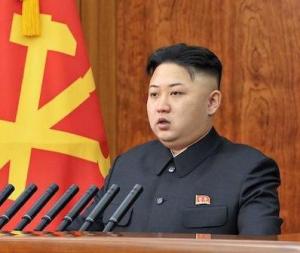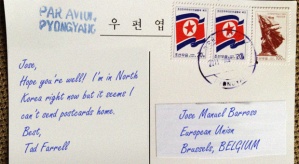 (By Leonid Petrov, Asian Currents, Feb. 2013) The New Year speech by North Korea’s new leader signals there will be little change…
(By Leonid Petrov, Asian Currents, Feb. 2013) The New Year speech by North Korea’s new leader signals there will be little change…
When the North Korean leader Kim Jong-Il breathed his last in December 2011, his youngest son Kim Jong-Un was catapulted to the country’s leadership. That permitted him to meet the people and play the role of populist and reformer.
Kim Jong-Un looked and behaved like his grandfather, Kim Il-Sung, the founder of the Democratic People’s Republic of Korea, who ruled for 46 years. His succession looked like a perfectly planned and well-orchestrated scenario, and no observers doubted the similarity was part of the transition plan.
On the first day of 2013, Kim Jong-Un addressed the nation from the state TV, just like his grandfather used to until his demise in 1994. Kim Jong-Il, on the other hand, avoided making public speeches and never gave a TV address during his 17-year-rule, publishing his New Year’s messages as joint editorials in North Korea’s three major newspapers. Obviously, the youthful new ruler was trying to appeal to North Koreans’ fondest memories of his grandfather, and to signal that his leadership style would be more in line with that of Kim Il-Sung.
The speech was an acknowledgement of the poor state of the country’s economy. Kim promised that 2013 would be ‘a year of great creations and changes in which a radical turnabout will be effected in the building of a thriving socialist country’. The speech was full of rhetoric calling on his countrymen to make tireless efforts to ‘rid themselves of the old way of thinking and attitude and make ceaseless innovations in all work’. Kim urged boosting the economy and the military’s capability by making the science and technology sector world class, and argued that ‘the industrial revolution in the new century is, in essence, a scientific and technological revolution’, and ‘breaking through the cutting edge is a shortcut to the building of an economic giant’.
Like his grandfather, who tried to instantly turn the war-torn North Korea into a communist paradise, Kim Jong-Un also looks for shortcuts. The problem with his plan is that he suggested nothing new, but encouraged his countrymen to stick to the old values and principles formulated by his late grandfather and father. Kim claimed that ‘road of chuch’e [national self-reliance] is the only path for the Party and people to invariably follow’.
Despite North Korea’s history of defeats, failures, famines and disappointments, Kim Jong-Un persisted in lauding ‘the great achievements the president made while leading the Fatherland Liberation War to brilliant victory’ and praised ‘the strength of his outstanding strategy and tactics and wise leadership’. He also urged the people to ‘carry out the cause of reunifying the country’, describing reunification as the greatest national task that ‘brooks no further delay’.
The theme of turning North Korea into an economic giant was the most recurring in the speech. The ostensible purpose of his plan was to make the people of Korea well off with nothing to envy in the world. For this, the people should wage an ‘all-out struggle this year to effect a turnaround in building an economic giant and improving the people’s standard of living’. By calling on all sectors and units of the national economy to boost production, Kim Jong-Un again simply repeated the style and rhetoric of his father and grandfather.
Instead of offering a meaningful formula for economic development, Kim simply recommended improved economic guidance and management: ‘Party organisations should embrace all the people, take warm care of them and lead them forward to ensure that they share the same destiny with the Party to the end’. That meant North Koreans should carry on ‘the tradition of single-hearted unity’ wherein ’the Party believes in the people and the latter absolutely trust and follow the former’. In other words, Kim had no other prescription than adhering to the old son’gun [military-first] politics of his father and the centrally-planned economic system of his grandfather.
The single-hearted unity of the Army and the people around the Party was the ‘strongest weapon and a powerful propellant for the building of a thriving socialist country’. Kim Jong-Un looked confident when he claimed that the military might of a country represents its national strength.
His speech avoided direct criticism of the United States and its allies. Nor did he mention nuclear weapons, but indicated that if aggressors dared launch a pre-emptive attack against the DPRK, ‘the People’s Army should mercilessly annihilate them and win victory in the war for the country’s reunification’. Boosting defence industry was another priority that could contribute to implementing the Party’s military strategy, and Kim urged developing more ‘sophisticated military hardware of our own style’.
His invitation to ‘spur the building of a civilised socialist nation to usher in a new era of cultural efflorescence in the 21st century’ was in sharp contrast to his recommendations to ‘conduct Party work in the same way as it was done on the battleline in the 1970s, and put a focus of the work on thoroughly applying Kim Jong Il’s patriotism in all activities’. In cultural construction as well, all sectors were advised ‘to implement to the letter the ideas, lines and policies set forth by the general’. In this context, it remains debatable how North Korea can develop education, public health, literature and the arts, physical culture, public morals and all other branches to the level ‘appropriate to an advanced civilised nation’.
In order to effect a radical change in this year’s campaign to build a thriving socialist country, ‘officials should make a fundamental turnabout in their ideological viewpoint, work style and attitude’. But will the Party bureaucrats voluntarily uphold the slogan ‘Everything for the people and everything by relying on them!’ set for them by their youthful and idealistic leader? No safeguards are suggested by Kim Jong-Un, who only asked them to ‘work to the best of their abilities with a high sense of responsibility, eagerness and an enterprising approach’. His conclusion is built on the premise that the nation can achieve prosperity only if ‘firmly rallied behind the Party under the banner of ‘Kimilsungism–Kimjongilism’.
The New Year speech tells much about Kim Jong-Un, the succession process, and the future of North Korea. It becomes clear that Kim’s ultimate goal is to avoid any change, because it threatens the very existence of the North Korean state. If anything like what happened to the Soviet Union when Gorbachev started perestroika happens in North Korea, the leadership would not be able to control the situation. And as North Korea’s elites are equally reluctant to consider any idea of change, the mood to maintain stability and continue as Kim Il-Sung and Kim Jong-Il did over the past half a century prevails.
The recent leadership succession is definitely a case of like father, like son. Kim Jong-Un is the legitimate successor and perfect choice to continue the Kim dynasty; he is of ‘revolutionary blood’ and widely recognised as such. He is eulogised and worshiped as the Generalissimo by the Korean People’s Army and as the Dear Leader by the Korean Workers’ Party. Common people link their expectations of socio-economic improvement to him, and he is a token of stability for the Kim family. Everyone in North Korea seems to have great hopes for him. If everything goes according to his father’s plan, Kim Jong-Un will be in power for a long time.
The North Korean leadership genuinely wants to modernise the country’s economy, but hates the idea of changes in social and political life. Like his father and grandfather, Kim Jong-Un constantly searches for shortcuts to boost the dysfunctional economy without having to build new social and political institutions. Achieving technological breakthrough without systemic reform is a preferred way forward. As a result of this half-hearted policy, ordinary North Koreans will probably eat and dress better; they might even own PCs and mobile phones, but they will continue to live in the same paranoid state of fear and dependency on the Great Leader’s decisions.
Beijing would love to see Pyongyang follow its example by introducing market-oriented reforms, but North Korea simply cannot come to terms with granting its population the many freedoms necessary to make such a reform successful. This is simply impossible in the conditions of an ongoing Korean War, in which North Korean society is continuously fed lies by the regime and denied contacts and interaction with the rest of the world, particularly with South Korea. Given the circumstances of the ongoing inter-Korean conflict, the sustainable development of the North Korean economy is impossible. The country is locked in a security dilemma and reluctant to open up.
If Kim Jong-Un did decide to initiate reform he would first need to persuade his family and other elite groups to forfeit their significant privileges, because reform of any type would inevitably and quickly lead to the collapse of the political regime. Not surprisingly, the very word ‘reform’ remains a taboo in Kim Jong-Un’s North Korea.
—
 (NKnews.org, 20 February 2013) Western tourists in North Korea have been banned from sending postcards home to friends and loved ones, supposedly as a result of “sanctions” passed in recent days and weeks.
(NKnews.org, 20 February 2013) Western tourists in North Korea have been banned from sending postcards home to friends and loved ones, supposedly as a result of “sanctions” passed in recent days and weeks.


You must be logged in to post a comment.